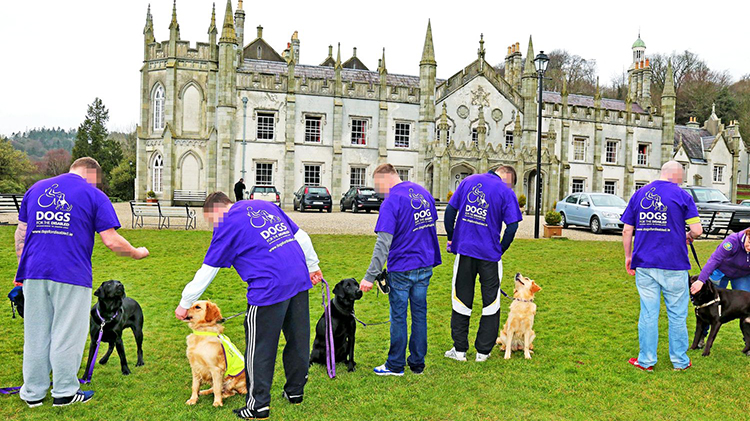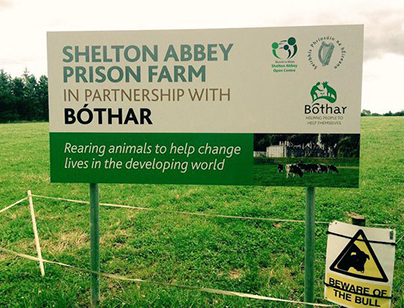Prison – should it be for punishment or rehabilitation?

Tue, 04 Oct 2016 15:00:00 BST
Shelton Abbey prison houses serious offenders in a relaxed atmosphere of landscaped gardens, offers freedom of movement and has no locked cells – the carrot or the stick to lower reoffending?
 RESEARCHERS at the University of Huddersfield are appraising a progressive Irish open prison located in a historic abbey and set among landscaped gardens. It offers a relaxed atmosphere and high levels of freedom to prisoners – many of whom committed violent crimes. Will the experiment lead to a cut in reoffending rates?
RESEARCHERS at the University of Huddersfield are appraising a progressive Irish open prison located in a historic abbey and set among landscaped gardens. It offers a relaxed atmosphere and high levels of freedom to prisoners – many of whom committed violent crimes. Will the experiment lead to a cut in reoffending rates?
That is the question that investigative psychologists Dr Maria Ioannou and Dr John Synnott (pictured right) hope to answer as they continue their research relationship with Shelton Abbey in County Wicklow and its innovative Governor, Conal Healy.
“He understands that prisons need to look at new and innovative ways to aid rehabilitation,” said Dr Synnott, who is Senior Lecturer and Assistant Course Director for the University’s MSc in Investigative Psychology.
Shelton Abbey has no locked cells and the 115 prisoners have freedom of movement within the jail. “But they do have places that they have to be at specific times, and they know this,” said Dr Synnott.
 “They work in the grounds, in fact there is a farm on site with animals that are housed there before being distributed by Irish charity Bóthar, which provides livestock to developing communities around the world. These animals need to be fed and taken care of and the inmates do this work. They also work in the gardens, planting trees and tending to the flower beds.”
“They work in the grounds, in fact there is a farm on site with animals that are housed there before being distributed by Irish charity Bóthar, which provides livestock to developing communities around the world. These animals need to be fed and taken care of and the inmates do this work. They also work in the gardens, planting trees and tending to the flower beds.”
One of the rehabilitation schemes being run is the Buddy Dogs programme in which inmates care for and train dogs that are destined as companions and helpers for the disabled.
“Prisoners also have access to mobile communication,” said Dr Synnott. “A lot of research shows that there is a direct link between rehabilitation and contact with the outside world.”
Initially, Dr Synnott and Dr Ioannou – who is Reader in Investigative and Forensic Psychology and Course Director for the Huddersfield MSc – were called in to evaluate the Buddy Dogs scheme, and their report impressed Governor Healy.
Now, the two University of Huddersfield experts aim to continue their relationship with Shelton Abbey so that they can research the effectiveness of all its innovations. They recently completed a project exploring wellbeing within the open centre facility that aims to contribute further to their understanding of such facilities.
Irish-born Dr Synnott has visited almost all of the country’s prisons, having developed contacts while carrying out research for his doctorate. He is therefore perfectly qualified to contrast Shelton with the rest of Ireland’s prison system.
 “The atmosphere that strikes you when you come into the place is that it is less intimidating, without that level of tension you might get when you enter a closed facility,” he said. “However, you must be aware that many of the individuals in there have committed some pretty serious offences. They have done terrible things – but that doesn’t mean that there’s not a way back for them.”
“The atmosphere that strikes you when you come into the place is that it is less intimidating, without that level of tension you might get when you enter a closed facility,” he said. “However, you must be aware that many of the individuals in there have committed some pretty serious offences. They have done terrible things – but that doesn’t mean that there’s not a way back for them.”
The fundamental debate about the prison system is its purpose, said Dr Synnott.
“Is it for punishment or rehabilitation? Is it about justice for the victim? The standard response from people on the street and in the media is that it should be punishment-based, but you can challenge that by citing figures that if you have been to prison once you have got over a 50 per cent chance of going back.”
Governor Healey at Shelton Abbey has made many innovations, said Dr Synnott. “But which are the things that are contributing to rehabilitation and which are not? And how can we increase investment in the ideas that contribute to lowering recidivism?” he asked.
There is a need for more research, to measure the impact of the Shelton Abbey approach and Dr Synnott and Dr Ioannou are keen to carry it out and disseminate their findings, which could have global significance if it can be shown that projects such as Buddy Dogs are transferable to penal systems in other countries.







